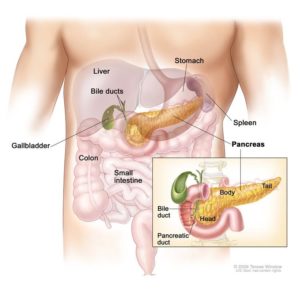Many of us are saddened by the passing of Alex Trebek. So many of us welcomed him into our homes and lives each evening — and learned a tremendous amount from him. Sadly, he was diagnosed with pancreatic cancer and battled it for nearly 20 months; he did so with courage and in so doing he showed the world what it means to live with cancer.
Pancreatic cancer remains a devastating diagnosis. The majority of patients, like Mr. Trebek, were diagnosed at an advanced stage. Early-stage disease rarely causes symptoms, but we urge patients to report any of the following to their doctor: weight loss, abdominal or back pain, changes in bowel habits, upset stomach, yellowing of the eyes or darkening of the urine. MD Anderson Cancer Center at Cooper has one of the region’s only screening programs for pancreatic cancer, focused on those at highest risk such as individuals with a family history of pancreatic cancer or particular hereditary syndromes. In experienced hands, novel therapies for pancreatic cancer and a multidisciplinary approach can offer patients hope for improved cure rates and better quality of life.
November is Pancreatic Cancer Awareness month. In honor of Mr. Trebek and all the patients who have been diagnosed with this disease, I encourage you to take time this month to learn more about pancreatic cancer.
Jamin C. Morrison, MD
Hematologist/Medical Oncologist
MD Anderson Cancer Center at Cooper

Your pancreas is about 6 inches long and lies horizontally behind the lower part of your stomach back toward the spine. The pancreas is an essential organ in the digestive process. It produces enzymes that aid in digestion and it makes insulin and other hormones that help the body manage sugar.
Leading the Way in Pancreatic Cancer Treatment
When pancreatic cancer is confined to the pancreas, and sometimes when it has spread only to nearby lymph nodes, the tumor can be removed with surgery. “Complete removal of the tumor with surgery is often the best chance at curing pancreatic cancer,” says Frank Spitz, MD, FACS, Director of the Pancreatic Cancer Program and Deputy Director of MD Anderson at Cooper.
“Research shows that patients who have their surgery at high-volume centers like MD Anderson at Cooper have fewer complications and lower mortality rates” says Dr. Spitz. “Our team performs the most pancreatic cancer surgeries in South Jersey. The experience of our surgeons and team makes a difference.”
No One Fights Cancer Alone
When cancer cells grow abnormally in your pancreas, doctors call it pancreatic cancer. Our doctors have extensive experience diagnosing and treating patients with pancreatic cancer.
At MD Anderson Cancer Center at Cooper, our cancer specialists use the most effective diagnostic methods and the latest research to determine the best treatment plan for you. We also offer a wide network of support services, so you won’t feel alone as you fight this disease.

